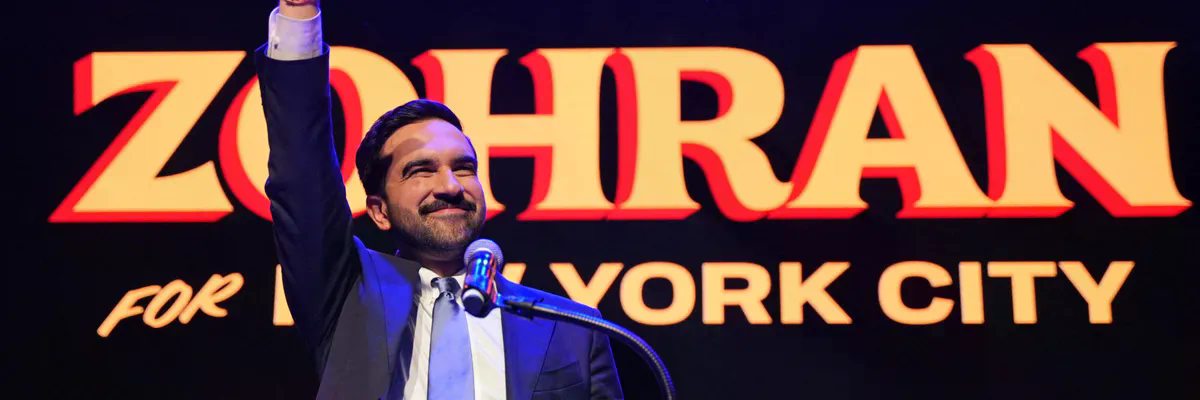
Zohran Mamdani was elected the next mayor of New York City on Tuesday, marking a significant shift in the city’s political landscape. His victory, which he and his supporters describe as emblematic of a broader national movement, reflects a growing demand for a new political paradigm that prioritizes the needs of working people over corporate interests and the agendas of the wealthiest.
Mamdani, a democratic socialist and member of the New York State Assembly, secured 50.4 percent of the vote in a three-way race. Former New York Governor Andrew Cuomo, who ran as an independent after losing the Democratic primary, received 41.6 percent, while Republican candidate Curtis Sliwa garnered just over 7 percent. The campaign was marked by intense opposition from the city’s elite, including negative advertising and fearmongering, yet Mamdani managed to overcome these challenges.
In his victory speech at the Paramount Theater in Brooklyn, Mamdani declared, “Hope is alive.” He emphasized that the election result was not just a personal triumph but a collective statement from New Yorkers who believe in the possibility of change. “While we cast our ballots alone, we chose hope together,” he said. “Hope over tyranny. Hope over big money and small ideas. Hope over despair.”
Mamdani highlighted the need for bold leadership that offers clear visions rather than excuses. “This will be an age where New Yorkers expect from their leaders a bold vision of what we will achieve, rather than a list of excuses for what we are too timid to attempt,” he stated.
Central to his agenda is addressing the cost-of-living crisis, with plans to freeze rents for more than two million rent-stabilized tenants, provide fast and free public transportation, and establish universal child care across the city. “Years from now, may our only regret be that this day took so long to come,” he added, expressing optimism for a future of continuous improvement.
The significance of Mamdani’s win extends beyond New York City. Progressives and Democrats nationwide view it as a demonstration of the potential of populist campaigns focused on the needs of working people. The results of Tuesday’s elections, which included major Democratic victories in various races and ballot initiatives, were seen as a strong rebuke to President Donald Trump’s policies.
Mamdani acknowledged the broader implications of the election, stating, “If we embrace this brave new course rather than fleeing from it, we can respond to oligarchy and authoritarianism with the strength it fears, not the appeasement it craves.” He also noted that New York, the city that gave rise to Trump, could play a key role in challenging his influence and preventing the emergence of similar figures in the future.
His victory has been hailed as a turning point for the Democratic Party, with many calling for a shift toward more populist and economically focused policies. Alexandra Rojas, executive director of Justice Democrats, described the win as a pivotal moment for the party, emphasizing the need for leaders who can unite voters against both Republican authoritarianism and Democratic corporatism.
Similarly, Aru Shiney-Ajay of the Sunrise Movement praised Mamdani’s leadership, stating that it represents the kind of direction needed to rebuild trust with working people and fight for a more equitable future. Michael Magazine, a local campaigner, echoed this sentiment, highlighting the power of grassroots movements in challenging entrenched interests.
Former labor secretary Robert Reich also commended the victory, noting that it serves as a reminder of the power of the people in the face of opposition from the oligarchy. Sen. Bernie Sanders, who endorsed Mamdani early in the campaign, called the win one of the greatest political upsets in modern American history, underscoring the potential for a government that truly represents the working class.
Rep. Alexandria Ocasio-Cortez, a prominent supporter of Mamdani, emphasized the importance of the victory not only for New York City but for the Democratic Party as a whole. She described the campaign as a two-front battle, both against Trump and the party’s old guard, and urged the party to move forward with a unified vision for the future.
“We have a future to plan for. We have a future to fight for,” Ocasio-Cortez said. “And we’re either gonna do that together, or you’re gonna be left behind.”


